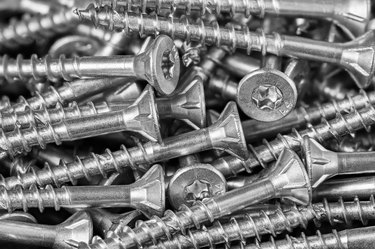
If you do work around the house, you must have tools stored in a tool closet, and it's a safe bet you have some old screws in there too. You meant to use them for some job long ago, and you never did. You may even have a whole jar of them, and as metal things do when left exposed to the air, they got rusty. Now you have a job for which they'd be useful, but you're wondering whether or not you should simply discard those old, rusty screws and buy new ones.
Well, no ... you shouldn't. You can use one of a number of simple methods to clean off the rust and make the screws as shiny as they were when you bought them. Of course, a commercial rust remover for metal will get the job done, but for the DIYer, it's more satisfying to do it with stuff you have around the house.
Video of the Day
Video of the Day
Household Acids That Dissolve Rust
Rust is iron oxide. It forms a film on ferrous metals, such as steel, when they are left exposed to the atmosphere through a complex process that involves both oxygen and moisture, and when left unchecked, it eventually corrodes the metal until there's nothing left. If your screws are corroded to the point at which they have lost their strength, it's time to get rid of them, but if they just have a rusty coating, all you need to do is dissolve that coating.
Acids can dissolve rust, but you don't need a strong acid to do the job. A commercial rust remover for screws would probably contain phosphoric acid, which is relatively weak, and other acids that can do the job include acetic acid and citric acid. If these acids sound familiar, it's because they are the acids that give the sour flavors to vinegar and lemon juice. There are two more food items that you can use as a rust remover for screws, and that's a raw potato, which is rich in oxalic acid, and a bottle of cola, which contains phosphoric acid.
Simple Rust-Dissolving Strategies
If you have a single screw that you want to clean, start by scrubbing off the rust with steel wool. If you put enough effort into it, that may be all you need to do. It may help to make a paste with baking soda and water, use that to coat the screw, and scrub it off after an hour or so. You can also clean a single screw by inserting it into a raw potato on which you've sprinkled a little salt and waiting for a few hours.
You need a faster method if you have a jar full of old, rusty screws to clean:
- Dump all the screws into a bowl and fill the bowl with distilled white vinegar. Wait overnight, rinse off the screws with plain water, and dry them. Don't leave the vinegar on the metal or the acetic acid will do its own damage.
- Fill the bowl with lemon juice instead of vinegar and let citric acid dissolve the rust. Don't forget to rinse.
- Use a soft drink containing phosphoric acid, such as Coca-Cola, to do the job. You might have to wait a little longer since the acid concentration isn't as high as it is in vinegar or lemon juice, but it will work. The screws will be sticky, so rinsing is definitely in order.
A Method for Science Enthusiasts
If you want to see the rust dissolving before your eyes, try electrolysis. This trick uses a car battery charger, a quart of water in which you've dissolved a couple of teaspoons of washing soda (not baking soda) and a spare nongalvanized nail.
Plug in the battery charger, connect the negative lead to the screw and the positive lead to the nail, and then immerse both the screw and the nail in the solution. A weak electric current will flow from the screw to the nail, and as that happens, the rust will flake off the screw and dissolve. The process happens quickly enough for you to see it happening, but it will probably take an hour for the screw to become rust-free.